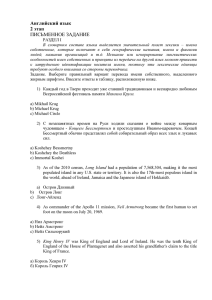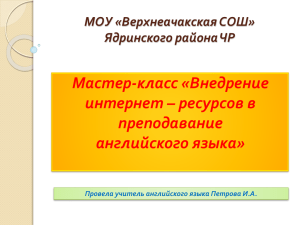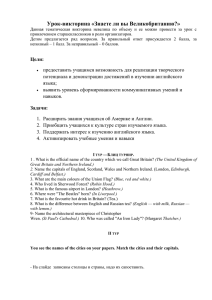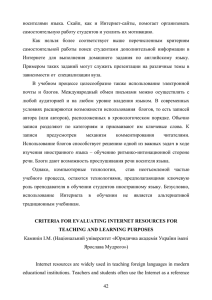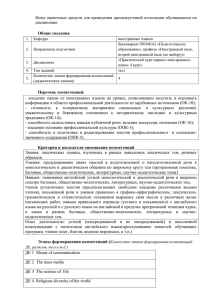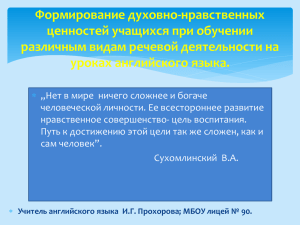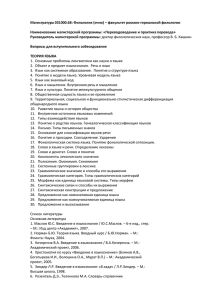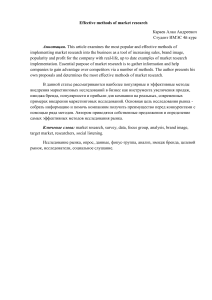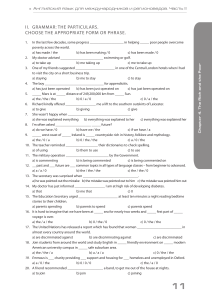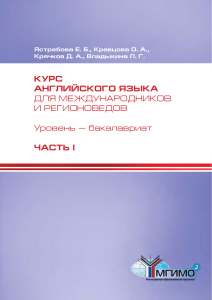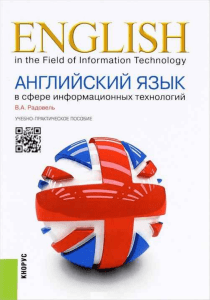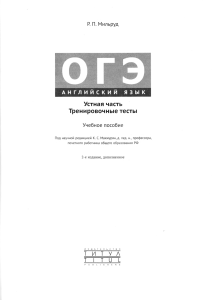
ПРАКТИЧЕСКОЕ ПРИМЕНЕНИЕ ИНОСТРАННОГО ЯЗЫКА В ПОВСЕДНЕВНОЙ ЖИЗНИ Семилетова Василиса Аркадьевна, ГА ПОУ КСО Свердловское художественное училище им. И. Д. Шадра E-Mail: vasilisa134@yandex.ru Аннотация. В работе исследовано использование иностранного, в частности, английского языка в повседневной жизни, трудовой деятельности, влияние изучения языка на мозговую активность. В современности, в постоянно развивающемся обществе, стремящемся к межнациональному сотрудничеству и космополитизации, не обойтись без изучения второго языка. Все более доступное перемещение между государствами, развитие интернет-пространства, объединение населения Земли для решения глобальных проблем подвигают приспосабливаться к новым условиям и расширять горизонты путем изучения английского языка, ставшего международным. Английский язык является языком общения, поэтому он используется во многих странах и на интернет-ресурсах. Это делает кругозор более широким, облегчает общение и научные исследования. При использовании социальных сетей английский язык помогает получать информацию прямо из источника или на узко специализированном ресурсе, не беспокоясь о неправильных переводах и происходящих в результате этого недоразумениях. В данной работе были рассмотрены наиболее возможные пути применения данного навыка и проанализирована степень эффективности влияния изучения иностранного языка на повседневную жизнь, интеллектуальное развитие и будущую профессиональную деятельность. Ключевые слова. Иностранный язык, английский язык, перевод, применение английского языка, польза иностранного языка. It is no secret that the modern world is diverse. It’s multicultural, hence multilingual. Never will there be a person able to fluently speak even half of all the languages of the planet. However, frankly, it is not required at all, for earthlings have long found a solution: one international language to understand them all. English was one of the least complex languages of the colonists. It was Great Britain, who contributed most to developing the global economy and international relations in the eighteenth century and whose language was used for trade. There is a saying by Jerome K. Jerome that reads: “Did the English-speaking races make it their rule to speak anything else than English, the marvellous progress of the English tongue throughout the world would stop.” As we know, it didn’t. Now in most countries English is taught to students of different age and backgrounds, and I too happen to be one of those students. In the school that I got to attend the English language and (in high school) the English literature were obligatory subjects, so we as children didn’t get to choose whether we needed to know a second language or not and what language it would be, precisely, so we had to do as we were told. This is what I’m now immensely grateful for. As time went by each of my classmates figured their own attitudes to learning languages, in which some were successful, others – not so much. As for me, I understood that I could not spend a day without using English, and not because of my school curriculum. Surfing the net, reading books, watching films, playing computer games, talking, even to myself when alone – I use the English language in each of these activities, in some cases even more frequently than Russian. Not only is it convenient to be able to know the language well enough, but it also brings me so much joy that I can’t imagine how people cope without such skill. In many ways English is a mean of connection to the world outside the borders of our own country, both in real life (all the signs in airports, shopping centres, maps, documents, at last, human communication) and online. Undoubtedly, a person’s impression on a situation that the world is in highly depends on the source they rely on, and I’ve figured that the elderly part of our 558 society is less informed about various events worldwide than my generation. Keeping track of all the news is unnecessary, but knowing what happens around the world definitely broadens the horizons and keeps us up to date with our planet. Of course, we are used to relying on the Internet, but it’s only possible to feel at home in a certain part of the Internet the language of which we understand. Figuring where to click on a webpage completely in English will probably be tricky for non-speakers. In my own experience that is not a problem anymore, in most cases. The situations I feel troubled in are ones when I try to find my way on a narrowly specialized resource, such as some scientific or art academies’ websites. It is not too complicated but does require more thought process than, for example, scrolling through Twitter. In the usage if social media English helps us get information straight from the source, not worrying about any mistranslations or misunderstanding, which may take place from time to time. Having an opportunity to write to someone in their language or just a language they are also learning, feels uniting; pretty much like in real-life conversations. That is, of course, if one puts trust in their own language skills. Otherwise being able to understand something without online translators may help you correct any grammatical or semantic errors that are not considered in their algorithms and sound more presentable. We encounter translations in many areas of life, most commonly in the entertainment sector. The point is that the translator is a conductor of the meaning; we get to hear or read things already filtered by someone else’s mind. In foreign films the audible part of an actor’s work gets muted and replaced by a dubbing actor’s voice. That is inevitable because not everyone understands foreign languages. However, those who can, get a chance to hear the original and get a more complete impression of the product. Almost the same thing happens to animated movies and even computer games. There are a great number of useful, and interesting, and funny videos on platforms like YouTube that may get dubbed, or usually subtitled, but no one can tell if these subtitles are valid or not. Reading books by foreign authors, we understand that this is the work of not only a writer, but also a translator. Good translations can preserve the impression of the writer’s style, bad ones may completely ruin the reader’s experience and a good book will get much less credit than it should. Even among the Russian fans of J. K. Rowling’s “Harry Potter” book series, there are controversial opinions on both of the official translations, and it still causes quite a lot of debate. I got used to watching videos by English-speaking bloggers, if possible, I always look for an original version of a movie in English, I just like to be sure that I can appreciate the creators’ work the way it was initially made. I tried reading J. R. R. Tolkien, Neil Gaiman, Terry Pratchett and even Virginia Wolf in original language, the latter appears to be fairly uneasy, but I believe practice makes perfect. I will also take an artist’s work for example, for this is what I expect my own career to be: one may rely on Google translate if a customer only speaks the language you don’t, or if the conversation is textual, but you may both communicate in one language, find a middle ground. In my experience there have yet been little interactions like this, but I am familiar with posting my art online for foreign viewers, and also being a user who sees others’ posts. I know that it is much easier to read a post in English than to translate Japanese or Italian elsewhere. Finding yourself on a freelance website is less stressful when you know the language. For freelance artists in Russia western audience is important, because there artists’ craft is not usually taken for granted or underappreciated as it often is in Russia. One more thing I use English for is working in programs that weren’t localised. It would be more time-consuming to translate every option using a dictionary and more troublesome to randomly test out every button. But let's take a closer look at the effect that learning a foreign language has on our brain. A human brain is an incredibly intricate system in which dozens of different processes are constantly occurring. One of them is building neural connections. Studying a new language is a very good intensification for that. Besides, it has been proved that a brain actually grows, particularly the hippocampus and some parts of the cerebral cortex. A person uses their brain more 559 effectively. To start with, the possibility of multitasking increases, and also does the rational thinking. Furthermore, bilingual children show better concentration, better reading and memorizing skills than those who have only been hearing their mother tongue since birth. Learning languages also prevents dementia and Alzheimer’s in old age, successfully replacing special medications on earlier stages of an illness. Recovery from a stroke is 40% more successful in patients with bilingualism. Finally, knowing several languages means having plural associations for each subject, having several outlooks on the world and significantly broadening the horizons of one’s mind. All of the above proves that studying a foreign language makes a great exercise for one’s brain and has a good impact on it even if a person doesn’t feel like exploring foreign cultures. In conclusion, learning the English language gives us plenty of opportunities in everyday life. English is a lingua franca, so it is used in many countries and on the Internet resources. It gives us a wider outlook and makes communication and research easier. Knowing a language we can watch and read originals, work with foreigners and all in all develop our brain in a fun way. Библиографический список 1. 2. 3. http://indigo-centre.ru/blog/kak-izuchenie-yazyika-vliyaet-na-mozg. https://www.eduneo.ru/kak-izuchenie-inostrannyx-yazykov-vliyaet-na-mozg/. https://englex.ru/english-as-an-international-language/. АНИМАЛОТЕРАПИЯ УЛИТКАМИ-АХАТИНАМИ КАК СПОСОБ СНЯТИЯ ПСИХОЭМОЦИОНАЛЬНОГО НАПРЯЖЕНИЯ У ДЕТЕЙ ДОШКОЛЬНОГО ВОЗРАСТА Серикова Наталья Александровна, Федеральное государственное бюджетное образовательное учреждение высшего образования «Московский государственный университет технологий и управления имени К.Г. Разумовского (Первый казачий университет)» E-Mail: batalina-n@inbox.ru Аннотация. В работе исследован способ анималотерапии с использованием улитокахатин для снятия психоэмоционального напряжения у детей дошкольного возраста. Современные дети часто испытывают психоэмоциональное напряжение, которое проявляется в эмоциональной неустойчивости, немотивированной агрессии, аутодеструкции, повышенной тревожности, замкнутости, гипервозбудимости, существенно осложняя взаимодействие ребенка с окружающим миром. Актуальность исследования заключается в поиске нового эффективного способа борьбы с детским психоэмоциональным напряжением. Цель исследования – представить новый возможный способ анималотерапии для борьбы с психоэмоциональным напряжением у детей дошкольного возраста. Методологическая основа исследования включает в себя методы теоретического, комплексного и системно-структурного анализа, обобщения научно-исследовательских и научно-методических публикаций, опыт эмпирической психологии. Научная новизна и результаты исследования. В публикации представлена авторская программа релаксационного тренинга по анималотерапии с использованием домашних улиток-ахатин, разработанная для снятия психоэмоционального напряжения у детей дошкольного возраста. В процессе прохождения данного тренинга ребенок посредством игры включается в исследовательскую деятельность, обогащая свой эмоциональный опыт и приобретая новые знания и умения. 560
